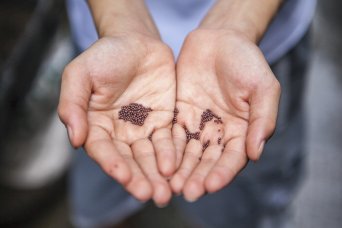- About
- Topics
- Picks
- Audio
- Story
- In-Depth
- Opinion
- News
- Donate
- Signup for our newsletterOur Editors' Best Picks.Send
Read, Debate: Engage.
| topic: | Sustainable Agriculture |
|---|---|
| located: | India |
| editor: | Bindu Gopal Rao |
Even as organic farming becomes the sustainable method of the future, it is important to ensure that historic heirloom seeds are available. The commercialisation of agriculture has generated a total dependence for farmers on external sources for farming inputs, including seeds, whereas in the past, they would save and share seeds. Today, seed companies are their major suppliers and often provide manufactured, hybrid seeds.
The importance of indigenous or heirloom seeds comes from the fact that they are more suitable to their native environments than any hybrid variety: they are hardy, pest-resistant, withstand unfavourable conditions in the area of their origin, require less water and nutritional inputs, fit in better with the organic method of farming and may even have special, idiosyncratic characteristics such as nutrition, fragrance or colour. Heirloom seeds are also open pollinating variants and produce plants that can also produce seeds.
With the passage of time, many native species are going extinct primarily because there are no efforts to conserve them. Farmers therefore become dependent on external sources for seeds that are often hybrids and genetically modified. To complicate matters, this kind of dependence on large companies, which control seeds and their prices, leads to the exploitation of farmers.
Protecting good quality, native seeds is also a way to ensure food safety and security, mitigating hunger.
Considering the importance of heritage seeds there has been a conscientious movement by organic farmers to conserve seeds and distribute them among their communities. Similarly, seed banks are working to not only conserve seeds, but also distribute them free of cost to farmers.
This is where companies like Mysore-based Sahaja Seeds, India’s first farmer-owned organic seed collective that promotes seed-saving communities are making a difference. Sangita Sharma from Annadana, based in the township of Auroville, Pondicherry, is also doing her part by propagating heirloom variants of seeds, as is Dr. Prabhakar Rao of Hariyalee Seeds, in Bengaluru who has a family-run farm which curates endangered and heirloom seeds from across the world.
As the world changes rapidly with growing environment concerns, food safety is often a topic that goes unaddressed. However, the survival of mankind depends on this issue, and one of its solutions could just lie in ensuring heirloom seeds are conserved and given the importance that they have always deserved.
